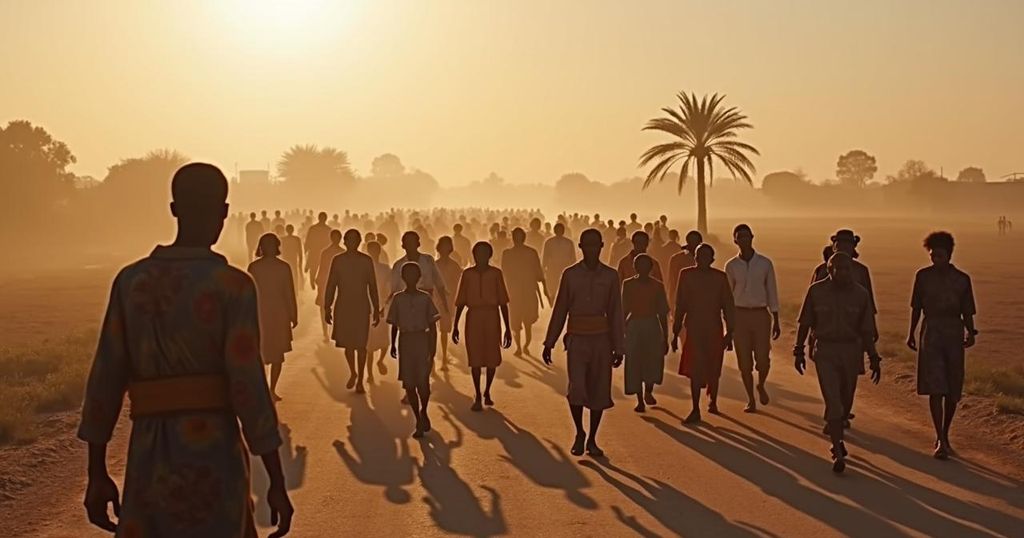Escalating Sudan Conflict Causes Alarming Surge of Refugees into Chad
The conflict in Sudan, now lasting over 18 months, has led to nearly three million people being displaced, with recent increases in refugee numbers pouring into Chad. The humanitarian situation is dire, with severe food insecurity and inadequate international support compounded by ongoing violence. UN officials underscore the urgent need for assistance as the situation worsens, predicting more refugees in the coming weeks.
The ongoing conflict in Sudan has precipitated one of the most alarming humanitarian crises in recent times, with nearly three million individuals displaced within the country and a continuous influx of refugees seeking safety in neighboring Chad. In just the first week of October, 25,000 people crossed into Chad, marking a distressing increase linked to escalating violence in the region, particularly in Darfur, where the situation has worsened significantly. Mamadou Dian Balde, the UN’s Sudan regional refugee coordinator, indicated that the total number of refugees would likely surpass three million shortly due to the intensifying conflict between the Sudanese Armed Forces and the paramilitary Rapid Support Forces, both of which have been implicated in severe human rights abuses, including targeting civilians and obstructing humanitarian efforts. As the war intensified in April 2023, with casualties numbering in the tens of thousands and approximately 26 million individuals facing acute food insecurity, the humanitarian situation has deteriorated alarmingly. Famine conditions have emerged in certain areas, including the Zamzam displacement camp in Darfur. According to recent data from the UN High Commissioner for Refugees (UNHCR), approximately 11.3 million people have been displaced, of which nearly 2.95 million have fled across international borders. Chad, which currently hosts the highest number of Sudanese refugees at 681,944, is struggling with its own economic challenges, lacking adequate resources to support this influx. Mr. Balde has commended the generosity of the Chadian people but has also called for increased international assistance, highlighting a funding shortfall in the UN’s appeal for $1.51 billion dedicated to supporting these refugees and their host communities. With this appeal only 27 percent funded, aid efforts remain severely constrained, exacerbating the ongoing crisis. Looking forward, Mr. Balde expressed concern that the number of refugees entering Chad is likely to escalate in the coming weeks, primarily due to the conflict’s intensification and adverse climatic factors affecting the region. Although negotiations have taken place with promises for humanitarian access, actual implementation has been inconsistent, limiting the flow of aid available to those in need. Mr. Balde reiterated the critical need for development actors to engage in supporting the livelihoods of Sudanese refugees to mitigate their reliance on humanitarian aid and emphasized the importance of advocating for peace in Sudan to quell the humanitarian disaster. He cautioned that the refugee crisis may extend beyond Chad, predicting increased migration towards southern Europe and other regions, including the Gulf countries, should the situation remain unresolved.
The humanitarian crisis stemming from the conflict in Sudan has been aggravated by a civil war that erupted in April 2023. The fighting primarily involves the Sudanese army and the paramilitary Rapid Support Forces, resulting in widespread violence, displacement, and severe humanitarian needs. The United Nations has raised alarms over the rapidly increasing number of displaced individuals, the lack of funding for relief efforts, and the ongoing violations of human rights committed by both factions in the conflict. Chad, as the largest host of Sudanese refugees, finds itself in a challenging position, balancing the influx of refugees with its limited resources.
In summary, the ongoing conflict in Sudan has triggered a significant humanitarian crisis characterized by a massive exodus of refugees into Chad. The escalating violence and humanitarian needs demand urgent international support, as local capacities are overwhelmed. Without decisive actions aimed at conflict resolution and enhanced humanitarian assistance, the situation is poised to deteriorate further, potentially leading to a wider migration crisis affecting multiple regions.
Original Source: www.barrons.com




Post Comment